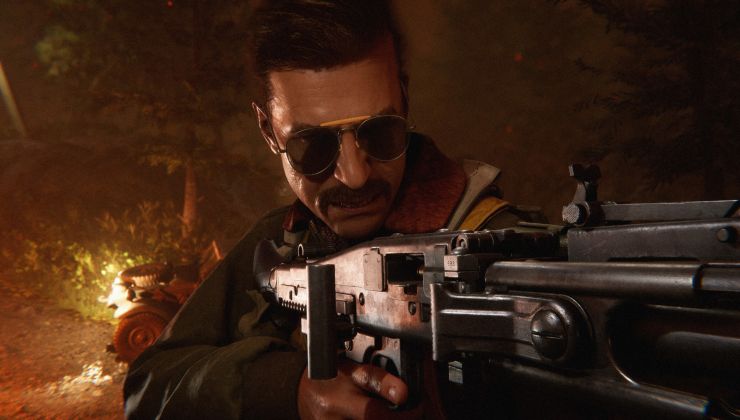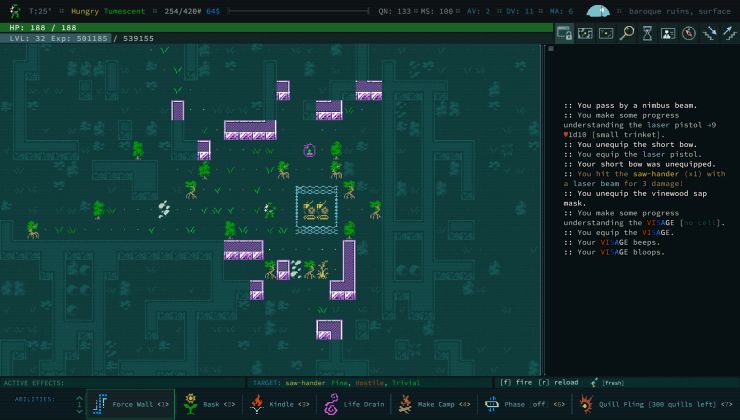It's always interesting to read about what happens inside of Valve. Rich Geldreich, who previously worked at Valve has blogged about his experience inside Valve during Valve's push towards Linux.
It seems Rich was a rather important member of the team and one of the influential people in getting OpenGL + Linux support up to scratch.
He was responsible for speaking to external driver teams and their managers/execs, and he helped present to external game developers about how to get good performance out of OpenGL.
I fondly remember reading the Valve blog post about getting Left 4 Dead 2 running faster on Linux than it did on Windows. I remember feeling so happy about everything that was happening. Rich Geldreich was the one feeding the information to Gabe Newell himself (the owner of Valve) who wrote the blog post.
It seems Valve's plans well and truly scared Microsoft too:
That's very interesting to read about. I had no idea Valve pushing OpenGL and Linux was this serious a threat that Microsoft visited Valve directly.
It sounds like we have a lot to thank Rich for. He even shares what a lot of other people believe, that Linux was/is a safeguard for Valve against Microsoft:
Sadly, it seems when Valve let a bunch of people go back in 2013, the Linux team suffered due to this.
Check out the blog post here.
It seems Rich was a rather important member of the team and one of the influential people in getting OpenGL + Linux support up to scratch.
He was responsible for speaking to external driver teams and their managers/execs, and he helped present to external game developers about how to get good performance out of OpenGL.
I fondly remember reading the Valve blog post about getting Left 4 Dead 2 running faster on Linux than it did on Windows. I remember feeling so happy about everything that was happening. Rich Geldreich was the one feeding the information to Gabe Newell himself (the owner of Valve) who wrote the blog post.
It seems Valve's plans well and truly scared Microsoft too:
Rich GeldreichA few weeks after this post went out, some very senior developers from Microsoft came by for a discrete visit. They loved our post, because it lit a fire underneath Microsoft's executives to get their act together and keep supporting Direct3D development. (Remember, at this point it was years since the last DirectX SDK release. The DirectX team was on life support.) Linux is obviously extremely influential.
That's very interesting to read about. I had no idea Valve pushing OpenGL and Linux was this serious a threat that Microsoft visited Valve directly.
It sounds like we have a lot to thank Rich for. He even shares what a lot of other people believe, that Linux was/is a safeguard for Valve against Microsoft:
Rich GeldreichIt's perhaps hard to believe, but the Steam Linux effort made a significant impact inside of multiple corporations. It was a surprisingly influential project. Valve being deeply involved with Linux also gives the company a "worse case scenario" hedge vs. Microsoft. It's like a club held over MS's heads. They just need to keep spending the resources to keep their in-house Linux expertise in a healthy state.
Sadly, it seems when Valve let a bunch of people go back in 2013, the Linux team suffered due to this.
Check out the blog post here.
Some you may have missed, popular articles from the last month:
Quoting: subSteam on Linux is clearly losing momentum, if Valve/Newell were really
up to change that - the money is there.
I don't worry about Steam. Rather about Linux gaming in general. And it doesn't seem to be losing momentum. Increasing number of studios now regularly release games for Linux, major engines are improving Linux support and etc. The trend is positive, not negative.
Valve so far also don't seem to have lost interest. They work on drivers / Vulkan and VR on Linux, which isn't a minor effort. My only concern is that they can end up with Steam only stuff (SteamVR is such example), that's not good.
Last edited by Shmerl on 5 January 2017 at 12:04 am UTC
3 Likes, Who?
Quoting: CorbenQuoteThey just need to keep spending the resources to keep their in-house Linux expertise in a healthy state.This little word "just" has such a big meaning...
I'm afraid, now that Microsoft has picked up DirectX again, improved Windows 10 as a gaming platform (with new features probably coming with the next big update), Linux is losing in the long run.
We are mostly late with releases, latest big thing were the Steam Dev Days showing VR on Linux. And everything else was shown on Linux/SteamOS Machines too, that was quite cool and impressive. But Valve isn't showing anything new or upcoming to us. So I'm wondering what do they have in their pipeline, if anything at all... and when.
2016 was a great year for Linux gaming in general, with a lot of big releases. Some of them finally released after being announced a long time ago. But what's coming next? I'm missing big announcements to get hyped for and to look forward to.
There are some kickstarter projects like System Shock or Everspace, but that can't be all. My concern is, publishers and devs might turn their back on us and go for Windows and maybe Mac only again. Even the Feral Radar is pretty empty (except for two upcoming mac only titles) at the moment.
Atm I'm using wine again for a lot of games, like No Man's Sky or Doom. Luckily OpenGL and Vulkan make this possible. But I want more native ports! I'm really afraid of 2017 after 2016 had such a great pace.
+1...totally.... :(
my feel is negative @Shmerl
Last edited by prueba_hola on 5 January 2017 at 12:10 am UTC
1 Likes, Who?
Quoting: Corben2016 was a great year for Linux gaming in general, with a lot of big releases. Some of them finally released after being announced a long time ago. But what's coming next? I'm missing big announcements to get hyped for and to look forward to.
There are some kickstarter projects like System Shock or Everspace, but that can't be all.
Quite a lot of good releases are coming out in 2017 (supposedly if they won't be delayed of course). Torment: Tides of Numenera, The Bard's Tale IV, Underworld Ascendant, System Shock (remake), State of Mind and etc. I don't think we'll be lacking good games.
Quoting: Corbenmy feel is negative @Shmerl
Why so? I might feel negative, when studios which started releasing for Linux would stop. That happened a few times in the past - CD Projekt Red, Larian (who supposedly don't even have Linux developers in house anymore and didn't include Linux version in crowdfunding for Divinity: Original Sin 2). But I think those are the minority. Most are continuing, and new developers start releasing for Linux in addition.
Last edited by Shmerl on 5 January 2017 at 12:17 am UTC
2 Likes, Who?
Quoting: ShmerlQuoting: Corben2016 was a great year for Linux gaming in general, with a lot of big releases. Some of them finally released after being announced a long time ago. But what's coming next? I'm missing big announcements to get hyped for and to look forward to.
There are some kickstarter projects like System Shock or Everspace, but that can't be all.
Quite a lot of good releases are coming out in 2017 (supposedly if they won't be delayed of course). Torment: Tides of Numenera, The Bard's Tale IV, Underworld Ascendant, System Shock (remake), State of Mind and etc. I don't think we'll be lacking good games.
And don't forget Yooka-Laylee!!!
i'm waiting this game : )
edit:
@Shmerl
My feel is negative, because all is slow ( i understand the industry always was with microsoft, change to linux can be slow )
so many games for linux are launched month more later than windows and well...i'm not sure about if steam are working hard...or only it has been a touch of attention to microsoft.
PS:sorry if my level on english is not the best....i'm not native english speaker
Last edited by prueba_hola on 5 January 2017 at 12:24 am UTC
0 Likes
Played a couple of rounds L4D2 after reading it. Still a fun game. :)
0 Likes
Ok, we all knew that Valve was pushing Linux to protect their business against Microsoft's obvious attempts to create an Apple-like monopoly on software distribution. There is nothing wrong with that. It did us good, despite they don't actually "love" Linux (Hint: Businesses love money more than anything).
I think Valve gave us the initial push to get us visible and viable as a gaming platform. And make no mistake - Microsoft is still dreaming of Windows Store being a monopoly one day. Valve cannot let us die, even if they are currently happy with the status quo of Linux being "just" a threat and nothing else. They will do what's necessary to keep us alive. Maybe not more. But certainly no less.
Right now, I am not worried about Valve. SteamOS is dead in the water, granted, but 2016 has also shown that SteamOS isn't really THAT necessary for Linux to thrive as a gaming platform. As a game developer, Valve has been a non-factor for a long, long time, so all I want from them at this point is supporting and expanding the Steam platform. And they seem to be committed to at least that part.
I am generally positive for 2017 to become a good, maybe even great year for Linux gaming. The ONE thing I am really worried about is basically every single AAA title on Linux relying on exactly ONE company to port them - Feral. And as awesome as Feral is, but monopolies are never a good thing (right, Microsoft?). No, in case you wonder, but I no longer consider Aspyr to be a serious Linux porting house. The one sore spot on an otherwise great Linux year 2016 was indeed the quiet demise of Aspyr as a Linux porting house. Sorry, but if a company needs an entire quarter year to asses the "feasibility" of porting a game (I am talking about Civ VI) to Linux, I can't take them for serious anymore. This is a laughable excuse for "Eh, we have no real interest in it". All source code is portable by definition, and a porting house worth their salt would know if any middleware components used for Civ VI would be available for Linux without even having to ask anyone.
If Valve really wanted to give us a push where it matters, then it would be encourage a few more larger publishers to start in-house porting their major releases. I realize that EA and Ubisoft would laugh them off, but how about bribing Rockstar or Bethesda a little?
Last edited by Kimyrielle on 5 January 2017 at 6:15 am UTC
I think Valve gave us the initial push to get us visible and viable as a gaming platform. And make no mistake - Microsoft is still dreaming of Windows Store being a monopoly one day. Valve cannot let us die, even if they are currently happy with the status quo of Linux being "just" a threat and nothing else. They will do what's necessary to keep us alive. Maybe not more. But certainly no less.
Right now, I am not worried about Valve. SteamOS is dead in the water, granted, but 2016 has also shown that SteamOS isn't really THAT necessary for Linux to thrive as a gaming platform. As a game developer, Valve has been a non-factor for a long, long time, so all I want from them at this point is supporting and expanding the Steam platform. And they seem to be committed to at least that part.
I am generally positive for 2017 to become a good, maybe even great year for Linux gaming. The ONE thing I am really worried about is basically every single AAA title on Linux relying on exactly ONE company to port them - Feral. And as awesome as Feral is, but monopolies are never a good thing (right, Microsoft?). No, in case you wonder, but I no longer consider Aspyr to be a serious Linux porting house. The one sore spot on an otherwise great Linux year 2016 was indeed the quiet demise of Aspyr as a Linux porting house. Sorry, but if a company needs an entire quarter year to asses the "feasibility" of porting a game (I am talking about Civ VI) to Linux, I can't take them for serious anymore. This is a laughable excuse for "Eh, we have no real interest in it". All source code is portable by definition, and a porting house worth their salt would know if any middleware components used for Civ VI would be available for Linux without even having to ask anyone.
If Valve really wanted to give us a push where it matters, then it would be encourage a few more larger publishers to start in-house porting their major releases. I realize that EA and Ubisoft would laugh them off, but how about bribing Rockstar or Bethesda a little?
Last edited by Kimyrielle on 5 January 2017 at 6:15 am UTC
6 Likes, Who?
"Porting houses" can become a thing of the past. Serious studios will accumulate knowledge in house and do cross platform development themselves. Some already realize it (inXile for example). Others are only getting the idea. With wider adoption of cross platform engines, all this will be less of an issue.
Last edited by Shmerl on 5 January 2017 at 6:24 am UTC
Last edited by Shmerl on 5 January 2017 at 6:24 am UTC
1 Likes, Who?
Quoting: Shmerl"Porting houses" can become a thing of the past. Serious studios will accumulate knowledge in house and do cross platform development themselves. Some already realize it (inXile for example). Others are only getting the idea. With wider adoption of cross platform engines, all this will be less of an issue.
One should think so, but look at who brought us pretty much ANY major title in 2016 not from Paradox Studios...
1 Likes, Who?
Quoting: KimyrielleQuoting: Shmerl"Porting houses" can become a thing of the past. Serious studios will accumulate knowledge in house and do cross platform development themselves. Some already realize it (inXile for example). Others are only getting the idea. With wider adoption of cross platform engines, all this will be less of an issue.
One should think so, but look at who brought us pretty much ANY major title in 2016 not from Paradox Studios...
And look at what games the worked with - all from legacy publishers from the likes of WB and Square Enix. Those aren't ones you'd even expect to be interested in Linux ever. For me those releases weren't relevant - I didn't even play them because of DRM. But I agree, that they represent mass market and are popular, so they are major in that sense (which in my experience doesn't necessarily equal to major in artistic quality).
So the trend will likely to continue. Legacy publishers will keep their heads in the sand, and sometimes will use third party porters to release games for Linux, while others (innovative / progressive publishers and developers) are more likely to develop for Linux themselves. The number of later ones is increasing, same as scale of games that they produce. So I don't really worry about legacy publishers being left behind.
Last edited by Shmerl on 5 January 2017 at 6:36 am UTC
0 Likes
Quoting: CorbenEven the Feral Radar is pretty empty (except for two upcoming mac only titles) at the moment.Actually one has Linux support indicated.
1 Likes, Who?








See more from me